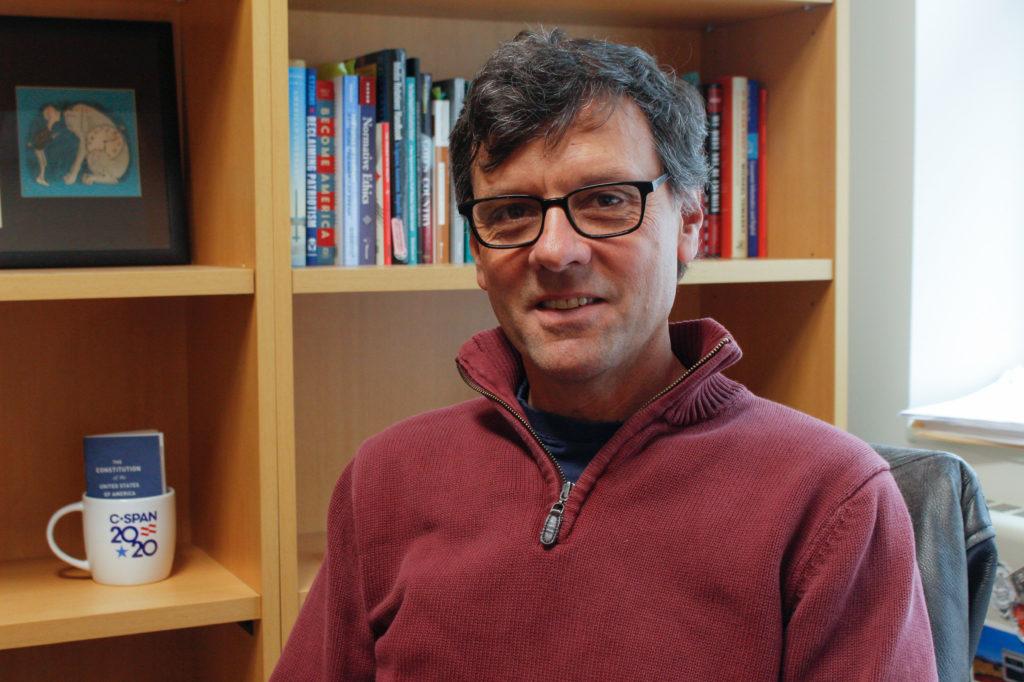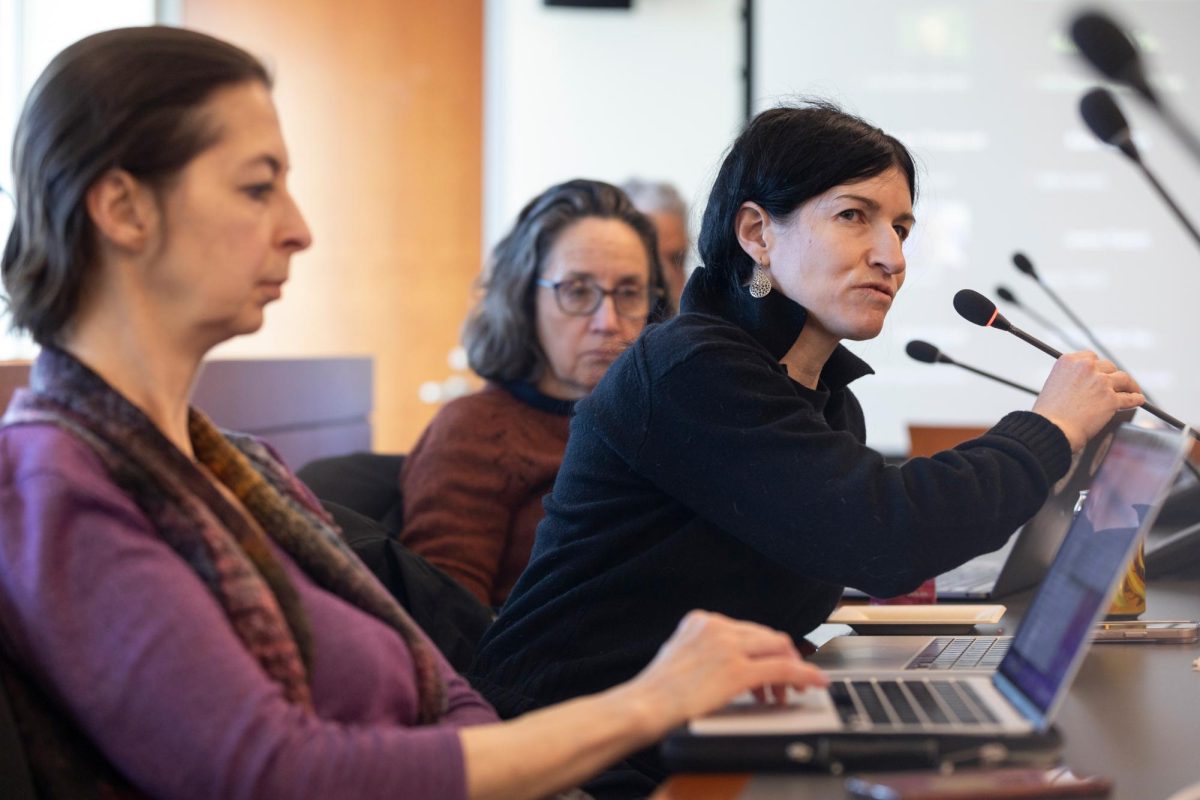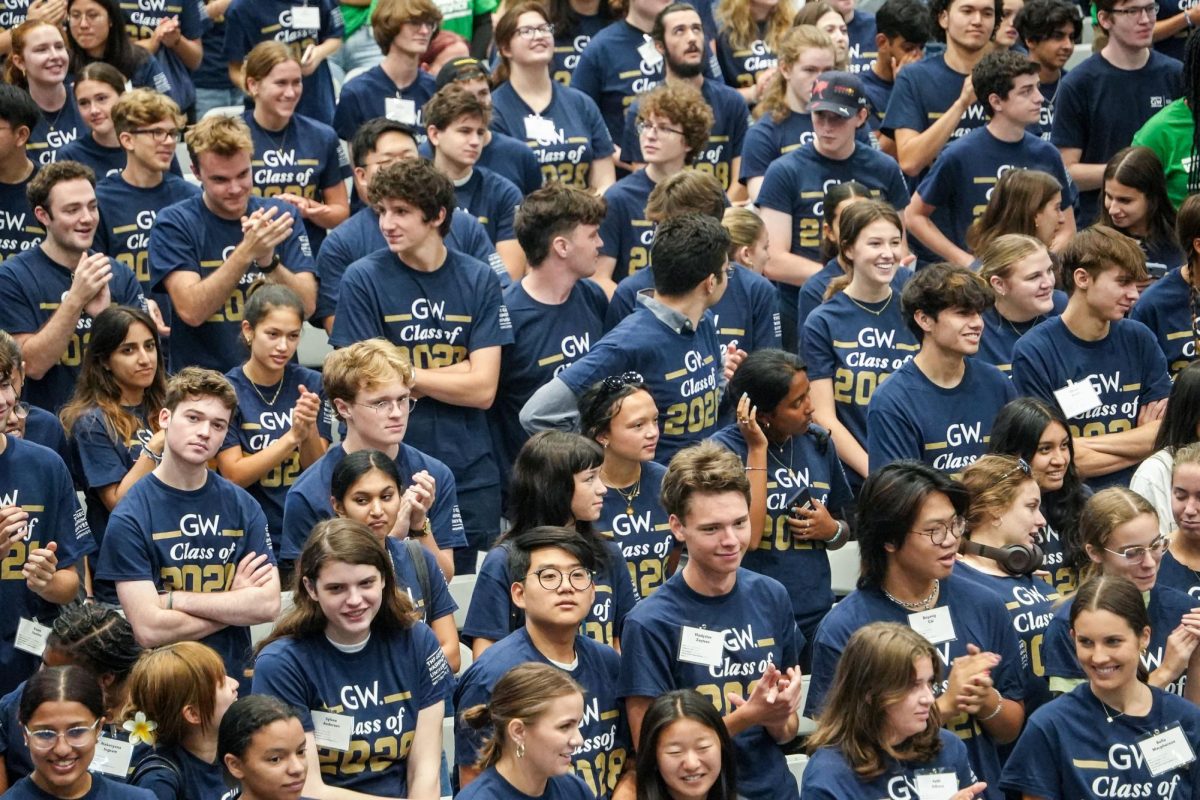After teaching through a computer screen from home for more than a year, faculty from disciplines across the University said they’re ready for class to meet face to face as in-person instruction resumes this week.
In interviews with more than 10 professors, faculty said they feel safe and excited to return to the classroom under the University’s COVID-19 reopening plan, citing GW’s “comprehensive” health and safety guidelines and practices. Faculty and students have attended classes remotely for the past two and a half semesters, and this fall marks the first time during the coronavirus pandemic that classes will resume in person with some new elements – classroom lecture recordings, indoor mask requirements and monthly COVID-19 testing.
Peter Loge, an associate professor of media and public affairs, said officials effectively prepared campus space and faculty for a return to in-person instruction with new safety protocols and video conference technology. He said the vaccine and mask mandates, new HVAC systems, GWorld tap access restrictions and testing requirements make him feel classes are protected against the spread of the coronavirus.
“It’s all of us together who decide how we’re going to behave together, so it’s up to you and me, your classmates and my colleagues, the staff and the administrators to get vaccinated, wear the mask, follow the rules,” Loge said. “So it’s us really, and I feel like we are doing the best we can.”
He said he realized over the past year that certain technologies, like Zoom and WebEx, can be helpful in the physical classroom with bringing guest speakers that are not on campus into his classes.
“It increases the number of speakers and guests and panels we can have,” Loge said. “It used to be somebody had to physically be in Foggy Bottom. Now they can be anywhere.”
Joseph Cordes, a professor of economics, public policy and public administration and international affairs, said GW’s vaccine requirement and indoor mask mandate set the University ahead of many other institutions in its reopening plan. He said he feels comfortable teaching in person with the safety measures in place, and those not in compliance with the University’s guidelines will likely face “appropriate consequences.”
“This is a complicated issue, and there’s not going to be an absolutely perfect solution to this until we get rid of the virus, but subject to that, I think we have a pretty comprehensive approach,” Cordes said.
He said he plans to provide lecture recordings for all of his students instead of just those who may miss class due to illness. He said he will continue allowing his students to review lectures multiple times because he realized how recordings benefited students during virtual instruction.
Cordes added that some faculty are likely to continue holding virtual office hours this semester depending on the state of the pandemic. He said virtual office hours may also be convenient for students who can attend from anywhere.
“I teach subject matter in economics and budgeting class where I honestly do believe that giving the students an opportunity to review the stuff twice is good for them,” Cordes said. “That’s something we would not have learned about if we didn’t have the pandemic. Those are all sorts of positive elements of the experience.”
Richard Robin, a professor of Russian and international affairs, said officials should expand exceptions for faculty to teach remotely because of “tight” classroom spaces, the spread of the Delta variant and the difficulty of teaching a foreign languages behind a mask.
“It seems only logical that we should be able to tailor our activities online or not depending on what we’re trying to do,” Robin said.
Senior Vice Provost Terry Murphy said at a Faculty Senate meeting earlier this month that faculty may instruct without masks indoors if they are more than six feet away from students.
Daina Eglitis, an associate professor of sociology and international affairs, said she is excited to return to class on campus and see students in person again after teaching over a computer since the start of the pandemic. She said she hopes that her students will help “cultivate” a respectful environment in the classroom if they follow safety precautions like mask-wearing.
“When people are on board with being civil, respectful and courteous toward other people, I think we will feel right,” Eglitis said. “We don’t really see that in larger society, but maybe we can have it in our little micro-environment.”
Eglitis said she sees value in remote learning and recorded lectures to accommodate students who become sick but still wish to attend class.
But she said she remains concerned about whether the technology will function properly and whether instructors know how to properly use it. She said a monitor in one of her classrooms was broken when she visited earlier this week.
“One of the lessons is that we have additional tools in our toolbox that we didn’t maybe realize or appreciate that enable us to both continue the learning process but at the same time not to create risk situations,” Eglitis said.
Hugo Junghenn, a professor of mathematics, said he is “optimistic” that GW’s safety measures like the mask mandate and monthly coronavirus tests will keep him and students safe. He said he is worried about struggling to understand students’ body language while they wear face coverings as he teaches.
“Students were not getting a college experience by sitting in front of a computer with an instructor droning on,” Junghenn said. “So this way I think it’ll be pretty close to the experience that they would like.”
David Rain, an associate professor of geography and international affairs, said in an email that some faculty wish for larger classroom spaces, especially in older buildings that have yet to complete HVAC systems upgrades. Officials said in an email to the GW community Saturday that they are continuing to renovate HVAC systems across campus buildings but failed to “provide sufficient detail and adequate context” about previous upgrades during the past school year.
Rain said he still feels safe teaching in person if all students wear masks and participate in periodic coronavirus testing.
“The indoor mask mandate means the campus will be safer than a grocery store or the Metro, even with the Delta variant spreading wildly in the Deep South, Texas and Florida,” Rain said.








